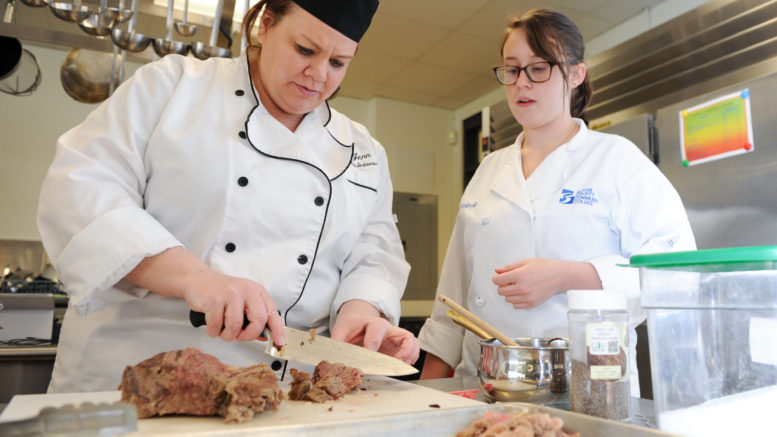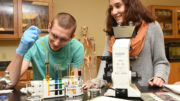Like the mixing bowl of Hollandaise sauce warming atop a 3-quart pot of simmering water in her classroom demonstration, Jennifer Taylor’s students will pick up steam – in their preparation for employment by planning and leading Butler County Community College’s first Hospitality Management Panel Discussion.
The Oct. 26 forum will provide students the opportunity to meet and query officials representing the restaurant, hotel, event planning, catering and tourism sectors that combined are expected to generate $840 million in revenue in Butler County this year, according to Jack Cohen, president of the Butler County Tourism and Convention Bureau.
All industries that in Butler County, Cohen said, “continue to grow.”
Accommodation and food services establishments numbered 377 in Butler County as of September, according to the state Department of Labor and Industry’s Center for Workforce Information and Analysis, ranking fifth behind health care and social assistance, retail trade, construction, and professional and technical services businesses. Nearly 7,300 workers were employed in accommodation and food services in Butler County, ranking fourth among sectors.
“There is a lot of demand today for trained individuals in this industry,” said Cohen, who will be a panelist in the forum, coordinated by Taylor, a BC3 hospitality instructor, and moderated by Dr. Christian Ola, BC3’s dean of business.
“The lack of numbers of those who are well-trained would make it a whole lot easier for those who are,” Cohen said. “In the hospitality field, you have to walk in and know what the expectations are. And that is very important for a student to know today.”
“You need to get a degree”
Taylor, who coordinates BC3’s hospitality management associate degree program and believes most of her graduates are capable of filling entry-level management positions, said she has a number of students who ask, ‘Why do I need to go to college? Why do I need to do this?’
Her answer: “If you want to put yourself ahead of the pack, you need to get a degree.”
BC3 students such as Savannah Neyman may put themselves ahead of the pack at the panel discussion by talking with hospitality industry representatives with whom they can complete their practicum requirement. That obligation accounts for up to five of the 62 credits needed to graduate with BC3’s associate of applied science degree in hospitality management.
“It is really intended for students to go up and shake some hands,” Taylor said.
The panel discussion may also introduce students to “other opportunities” they could pursue, Neyman said.
“They can become aware of part of the industry that they didn’t even know existed,” Ola said, and upon graduation, meet employers’ demand for professionals who work well with others.
“Soft skills, soft skills, soft skills,” Ola said of requests he hears repeatedly from employers. “‘I need people with soft skills. I need people with experience.’ Here you go. So if you are a hotel chain representative and are coming here, you not only have a student who has developed those soft skills, but they also understand the industry lingo, the different demands.”
“Keep our people here in Butler County”
Twenty-one students are enrolled this fall in BC3’s hospitality management program, according to Sharla Anke, BC3’s assistant dean of institutional research.
Graduates will have learned, among other topics, about customer service, food and beverage purchasing, cost-control analysis and how to prepare food. They may also seek jobs as a food service or catering manager, event planner, or restaurant assistant manager.
“We like to keep our people here in Butler County,” Cohen said. “And if they are trained and if they can find work here, the odds are that we can give them the opportunity and they will stay here.”
Cranberry Township alone is home to 90 restaurants, Cohen said, and the number of hotel rooms in Butler County has increased from 1,184 in 2001 to more than 3,000.
Travelers to The Pittsburgh and Its Countryside Region – Allegheny, Armstrong, Beaver, Butler, Greene, Indiana, Lawrence and Washington counties – spent nearly $8.1 billion in 2015, according to the Economic Impact of Travel in Pennsylvania, a report from Tourism Economics, an Oxford economics company.
That represents an increase of nearly 4 percent from the previous year and a new record high, the report states. Of Pennsylvania’s 11 traveler areas, The Pittsburgh and Its Countryside Region experienced the third-highest level of traveler spending.
“There are multiple opportunities, from hotels to the restaurants we have here,” Neyman said. “Even being a hostess somewhere because you can always work your way up to where you want to be.”
BC3 job-seekers “should be one step ahead”
Taylor’s graduates will not have to be taught by an employer how to process food costs, how to determine the capture rate of a hotel restaurant, or how to make the Hollandaise sauce atop a pot of simmering water so that “it doesn’t become scrambled eggs and butter,” as she told Neyman and Brandon Barraclough during a demonstration Wednesday.
“If we can teach those things here, when they go into an interview, they should be one step ahead,” Taylor said. “An employer with a fully qualified student can say, ‘Hey, I don’t have to train them on everything. I just have to train them on our way.’ And that is a huge, huge advantage.”
For more information, contact Jennifer Taylor at (724) 287-8711 Ext. 8037 or Jennifer.Taylor@bc3.edu.
Photos submitted





Be the first to comment on "BC3’s First Hospitality Forum to Cater to Job-Seeking Students"